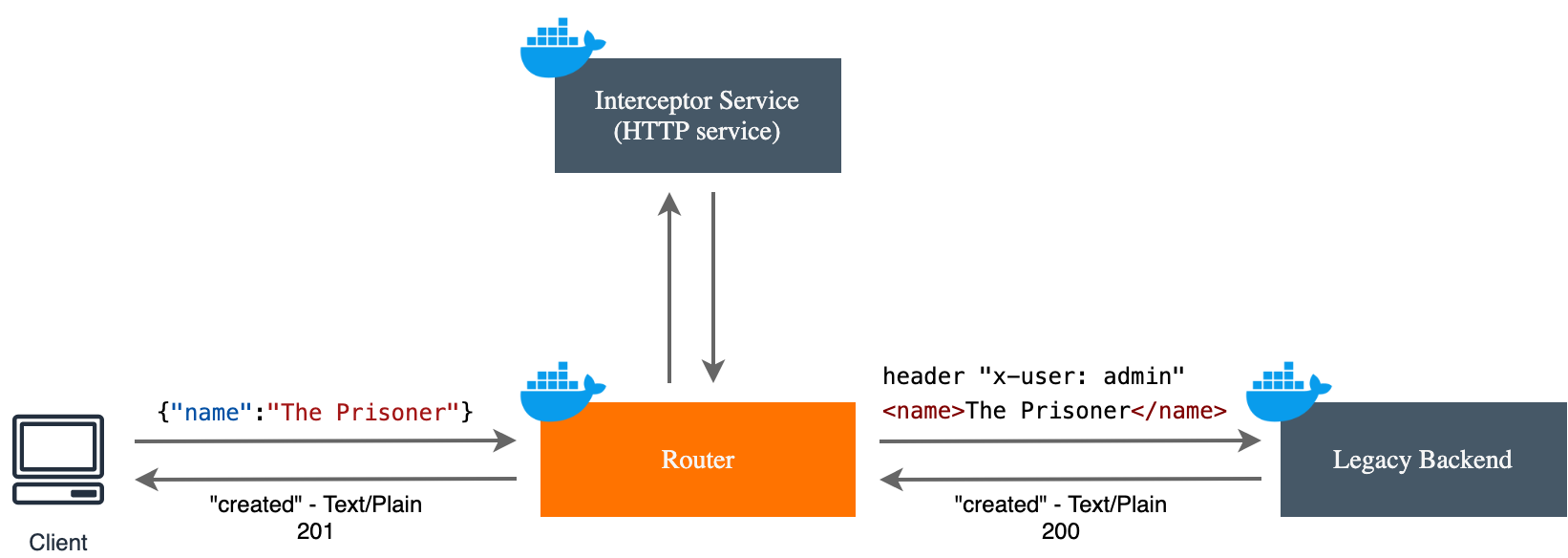Sample Interceptor Services¶
Sample 1 - JSON to XML transformation for a Legacy Backend - Book Store¶
Let's consider a legacy backend named "Book Store". The resource /books with the method POST accepts an XML
request to add a new book. If the header x-user: admin is not present in the request to the server, it responds
with the 401 HTTP status code. If the book insertion is successful, it is 200.
The requirement is to make the API accept a JSON payload and if the book gets created successfully,
respond to it with the HTTP status code 201. Since the response returned from the backend is satisfactory, there is no need to modify the response.
The following diagram describes what the scenario that we are attempting to implement based on the requirements.

Since you read the request body in request interceptor, you need to add request_body in the includes section of Open API Definition of the API.
The same microservice is used to handle both request and response interception.
x-wso2-request-interceptor:
serviceURL: https://xml-interceptor:9081
includes:
- request_body
x-wso2-response-interceptor:
serviceURL: https://xml-interceptor:9081Try out the sample¶
You can find the implementation of the interceptor service in the Choreo Connect GitHub Repository. Clone the repository and change to the cloned path.
-
Start the Choreo-Connect Docker compose setup if you have not started it yet. For instructions, see Deploying Choreo Connect as a Standalone Gateway on Docker.
-
Find the sample interceptor implementations in the directory samples/interceptors. You can find implementations for following languages.
- Ballerina
- Node.js
- Java
- Go
-
Change to the directory
samples/interceptors/<PROGRAMMING_LANGUAGE>and start the Docker compose setup with the legacy backend and interceptor service.docker-compose up
Directly invoke the backend¶
The port of the backend server is bound to the host in the docker-compose.yaml. So we can test it first. Check the HTTP status code in the response.
curl -X POST http://localhost:9080/books -d '<name>The Prisoner</name>' -H 'x-user: admin' -vThe response body should be created with the status code 200.
curl -X POST http://localhost:9080/books -d '<name>The Prisoner</name>' -H 'x-user: john' -vThe response body should be <response>Error</response> with the status code 401.
Invoke the API¶
First, change the directory to samples/interceptors.
Now lets initialize the API and add the interceptor certificate to the project. You have already added the CA cert of the Choreo Connect router.
apictl init bookstore --oas bookstore-api.yaml
mkdir -p bookstore/Endpoint-certificates/interceptors/
cp resources/certs/interceptor.pem bookstore/Endpoint-certificates/interceptors/Create adapter environment if it does not already exist.
apictl mg add env dev --adapter https://localhost:9843 Deploy the API.
apictl mg login dev -u admin -p admin -k
apictl mg deploy api -f bookstore -e dev -kLet's invoke the API with the JSON body {"name":"The Prisoner"}.
TOKEN=$(curl -X POST "https://localhost:9095/testkey" -H "Authorization: Basic YWRtaW46YWRtaW4=" -k -v)
curl "https://localhost:9095/abc-stores/books" \
-H "Authorization:Bearer $TOKEN" \
-H "content-type: application/json" \
-d '{"name":"The Prisoner"}' -v -kThe response body is created with status code 201 with the provided JSON body. You have now successfully modified the HTTP status code without touching the
response body of the backend.